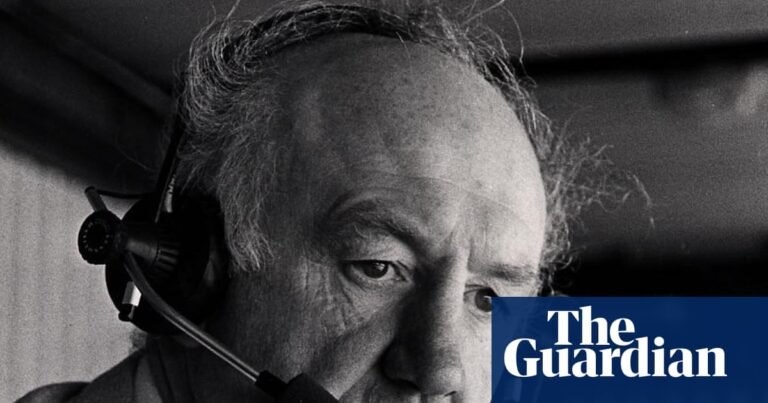Although Ray French was a dual rugby international, winning four caps for England at rugby union and then, after signing professional terms to play rugby league, appearing four times for Great Britain, it was as the BBC’s rugby league commentator that he came to national prominence.
French, who has died aged 85 after living with dementia, succeeded Eddie Waring as the BBC’s voice of the sport in 1981, spending 27 years in the role. Waring had established a public profile, beyond his verbally eccentric rugby commentaries, via frequent appearances in light entertainment shows and knockabout comedy routines. And, like Waring before him, French too became a somewhat divisive figure among a cohort of rugby league supporters who believed he entrenched a stereotypical perception of their sport. With his distinctive Lancashire enunciation, catchphrases and characteristic lexicon, his critics accused the national broadcaster of choosing a figurehead designed to “keep the sport in its place”: an idiosyncratic pastime of northern England.
However, to focus solely on his presentational style would be to mask the depth of knowledge French had for both codes of rugby, especially league. His command of the history of the two codes and his personal experiences of the prejudices constantly marring their relationship were leitmotifs running through his spoken and written work, imbuing his delivery with authenticity.
He also called some of the most celebrated matches during his BBC tenure, including the 1985 Challenge Cup final between Wigan and Hull, oft-regarded as the greatest final of all, and 12-man Great Britain’s against-the-odds victory over Australia at Wembley in 1994 when fellow cross-coder Jonathan Davies scored one of the finest tries seen at the stadium. “Davies, he’s got some space. He’s going for the corner, he’s got his head back. And the Welshman is in for a magnificent try” are words longstanding supporters can recite verbatim.
Despite such highlights, French always said his most professional achievement at the BBC was during the second half of a commentary when, stuck high on a gantry, he was so desperate to relieve himself that, while still speaking, he was forced to use a bucket held by his match summariser.
Meanwhile, his books – which include My Kind of Rugby: Union and League (1979) and Ray French … and Rugby (2010) – explore the complex socioeconomic and political relationships between the two rugby codes. And despite the longstanding animosity between them, often based on class and misplaced prejudice, he did much to break down barriers he considered absurd. Indeed, French was an advocate of a single rugby code, noting that “the strength of rugby union is along the M4 corridor from London into Wales, while the strength of rugby league is along the M62 corridor in northern England. If rugby stopped dividing its resources, we’d have a game to challenge football.”
Raymond James French was born on 23 December 1939 in St Helens. His father, Richard, worked in the local glass industry and his mother, Ellen, was a homemaker. Although raised in a rugby league-supporting family, in 1955 a scholarship took him from Rivington Road school to Cowley Grammar in nearby Windle where he first encountered rugby union. There his prowess as a robust back-row forward attracted the interest of the St Helens rugby union club. He quickly won Lancashire county honours and the attention of the England selectors.
He won four international caps, playing second-row in England’s Five Nations matches in 1961. Despite England’s disappointing campaign, French prospered amid a mediocre pack and looked set for further call-ups. However, St Helens, his hometown professional rugby league club, had been monitoring his progress and in late 1961 offered him a £5,000 contract which initially he turned down. But the opportunity to play his favoured code eventually proved irresistible. He became part of the club’s formidable forward pack, playing an integral role in Saints’ double-winning season of 1965-66 as they won the Championship and Challenge Cup.
However, although he had become club captain, St Helens sold French to local rivals Widnes in 1967. He wasn’t especially pleased, describing it as “feeling like a piece of meat on a supermarket shelf” but it would be at Widnes where he earned his rugby league international honours, travelling to Australia and New Zealand with Great Britain’s 1968 World Cup squad. Unfortunately, the team’s lacklustre performances meant many squad members, including French, would not be selected again.
Meanwhile, while still playing professionally at St Helens, French studied for a degree in English, Latin and Russian at Leeds university. He graduated in 1962 and applied for teacher training at Loughborough university, only to be turned down because he was a rugby league professional. He eventually qualified back at Leeds and taught English at his alma mater Cowley, where he stayed until retirement. It was during his time at Cowley that French began commentating on rugby league for local radio, eventually progressing to the BBC.
He was awarded the MBE in 2011 for services to rugby league. The man-of-the-match award in the 1895 Cup Final for lower-division teams is named after him, reflecting his love of, and involvement in, grassroots rugby.
He married Helen (nee Bromilow) in 1963. She survives his, as does son Gary and daughter Susan.
Raymond James French, rugby league player, journalist and sports commentator, born 23 December 1939, died 26 July 2025
